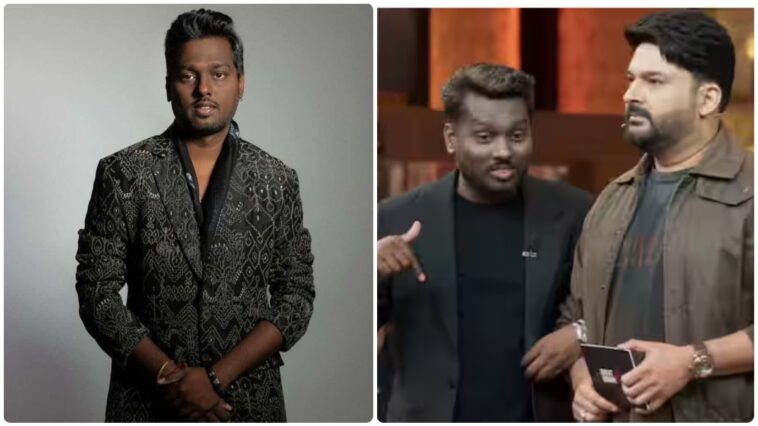Popular comedian and television host Kapil Sharma has come under fire after his interaction with Tamil film director Atlee on The Great Indian Kapil Show led to accusations of racism. The incident occurred during the episode released on December 17, 2024, on Netflix, and since then, the exchange has sparked debates on humor, sensitivity, and cultural respect. While Kapil Sharma defended himself against the allegations, the controversy continues to dominate social media discussions and headlines.
What Happened on the Show?
During an episode of The Great Indian Kapil Show, Kapil Sharma, known for his humorous takes and comic timing, welcomed Atlee, the acclaimed director of blockbuster movies like Jawan and Bigil. Sharma reportedly made remarks that were perceived as racially insensitive and offensive.
Kapil’s question to Atlee went viral after the episode aired. He asked,
“Atlee sir, actually you are so young, and you have become such a big producer-director. Has it ever happened that when you went to meet a star for the first time, they didn’t realize you were Atlee and asked, ‘Where is Atlee?’”
Though Sharma’s tone appeared casual and humorous, many viewers interpreted this as a veiled comment on Atlee’s appearance, especially his darker complexion.
Atlee’s Graceful Response
Atlee’s reply was composed and dignified, quickly earning him praise for handling the situation with poise. He shared his experience of working with filmmaker AR Murugadoss, saying:
“I am actually very thankful to AR Murugadoss sir because he produced my first film. He asked for a script, but he did not see how I was looking or whether I am capable of it or not. But, he loved my narration. I think the world should see that. We should not judge by appearance.”
Atlee’s response, advocating for people to look beyond physical appearance and focus on talent and character, struck a chord with the audience. Many took to social media to laud his graceful handling of the situation.
Public Backlash and Reactions
As soon as the clip surfaced online, it triggered widespread debate. Many viewers accused Kapil Sharma of crossing the line with his remarks. Social media platforms, particularly X (formerly Twitter), became a hub for criticism. Users expressed disappointment, calling Kapil’s comment unnecessary and tone-deaf.
- One user tweeted: “Kapil Sharma subtly insults Atlee’s looks? How low can comedy go? Disappointed.”
- Another wrote: “Atlee’s reply was so classy, but Kapil Sharma needs to learn that jokes about someone’s appearance are not funny.”
Singer Chinmayi Sripaada, a prominent voice against discrimination and misogyny in the entertainment industry, also weighed in, calling out the comments as “offensive and disappointing.”
However, there were also those who defended Kapil Sharma, claiming that his words were taken out of context and that humor is subjective. Fans of the comedian suggested that his intention was light-hearted, as is the norm on the show.
Kapil Sharma Responds to the Allegations
Amid growing criticism, Kapil Sharma broke his silence and addressed the controversy via social media. He denied making any comments about Atlee’s looks and urged people not to spread negativity. Sharma posted on X (formerly Twitter):
“Dear sir, can you please explain where and when I talked about looks in this video? Please don’t spread hate on social media. Thank you. (Guys, watch and decide by yourself. Don’t follow anybody’s tweet like a sheep).”
Kapil’s response attempted to clarify that his intention was not to hurt or demean anyone. However, the statement received mixed reactions. While his loyal fans stood by him, others felt that Sharma failed to take responsibility for the impact of his words.
The Larger Debate: Comedy vs Sensitivity
The controversy surrounding Kapil Sharma’s remarks on The Great Indian Kapil Show has reignited a larger conversation about the boundaries of comedy. While humor often involves satire and exaggeration, critics argue that it should not come at the cost of offending individuals or perpetuating harmful stereotypes.
Instances of comedians facing backlash for jokes on race, gender, and body shaming are becoming increasingly common as audiences demand greater accountability. Many argue that humor must evolve to reflect changing social norms and cultural sensitivities.
Audience and Industry Reactions
The incident has divided opinions within the entertainment industry. While some celebrities have remained silent, others have subtly supported Atlee’s response without directly addressing Sharma’s comments.
Atlee, on his part, has continued to maintain a dignified silence after his initial statement. His focus on promoting inclusivity and judging individuals by their abilities, rather than appearance, has earned him widespread admiration.
Conclusion: Lessons for the Future
The Kapil Sharma-Atlee controversy serves as a reminder of the power and impact of words, especially when uttered on a global platform like Netflix. While comedy is subjective and often relies on pushing boundaries, it is essential for entertainers to be mindful of their audience’s evolving sensibilities.
Atlee’s calm and measured response turned what could have been a negative situation into a moment of grace and inspiration. On the other hand, Kapil Sharma’s comments have sparked necessary debates about where to draw the line in humor.
As the dust settles, the incident encourages comedians, entertainers, and audiences alike to rethink humor’s role in promoting inclusivity, respect, and sensitivity. Whether Sharma’s remarks were intentional or not, the controversy serves as a call for mindful comedy in today’s diverse and interconnected world.
This episode of The Great Indian Kapil Show will undoubtedly remain a talking point for some time, as the balance between entertainment and cultural awareness continues to evolve.




GIPHY App Key not set. Please check settings